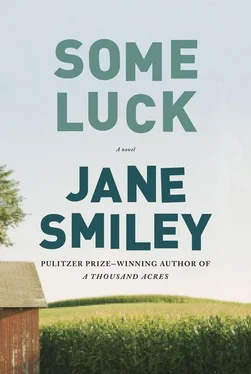And then it was an alliance no more, and, speaking of Canada, Julius, now thirty-five (he was a year younger than Eloise), went off to Canada to join the war effort; that was what Englishmen living in the United States had to do, especially after the Smith Act, which might have deported him, anyway. A week after he left, which was three days after the invasion of the Soviet Union by Nazi forces, she took Rosa to the train, bought them a last-minute ticket, and headed west. All the way to Usherton, she contemplated keeping going — she had enough money for the fare to Denver, or even to San Francisco, and Ina Finch, who had been her friend in the Party, had moved to San Francisco and would be happy to put her up, she was sure. But she got off at Usherton just as if she hadn’t the imagination to go farther, and there she was. She called her mother from the station, and her father came by half an hour later and picked them up. She had told them nothing about Julius’s departure. The war was close. The war was very close.
Eloise and Rosanna had joked over the years that maybe John would never get married — he could listen to their father shouting without turning a hair, but every time their mother sighed, he went pale. However, he was married now, not quite thirty and the girl was a plump thing whose eyes closed every time Granny Mary told her to do anything that she didn’t want to do. Over supper, she scraped every bit of food out of every serving dish, onto her plate, and complimented Granny Mary on all the food, as if she hadn’t had a thing to eat in weeks. She was so talkative that Eloise saw that everyone else got quieter and quieter as the meal progressed. Rosa, who had been excited to get back to the farm, didn’t say a word.
In the parlor, her father took a nap (he had been cultivating the cornfields since breakfast) and her mother continued with her needlepoint, which was a picture of three trees in a rolling field, with Canada geese flying off to the left. Her mother said, “Well, poor Julius, what a choice to have to make.” She glanced toward the door in case Rosa should appear.
“Who’s going to avoid that choice, Mama?” said Eloise. “You know we’ll have to go in.”
Her mother tutted, then said, “Lindbergh says we’re better off staying out of the whole thing. It’s not our business.” She glanced at Eloise, then said, “I’m not saying I know what to do.”
Eloise tried to make her voice level. “Lindbergh thinks the Nazis aren’t that bad. He’s wrong.”
“How do you know?”
“What I hear at the paper. What I hear at meetings.”
“Oh, meetings,” said her mother. Eloise felt her hackles rise. But she and Julius often discussed whether you could believe what you heard at meetings. They discussed that after almost every meeting, in fact. Her mother peered into her sewing box and pulled out a skein of magenta thread, then delicately picked off a length and began to separate the strands. She said, “Meine Söhne brauchen nicht um ihr Leben zu opfern für die Engländer. Oder die Russen für diese Angelegenheit.”
“I understand what you said.” The gist of it was that her mother, normally the most amenable of women, would not allow her sons to die for the English or the Russians.
“I hope you do.”
Then Eloise said, “Ja, gut, haben die letzten Worte an dieser Stelle nicht gesagt worden, egal was du sagst.” She thought she sounded pretty good — only about 5 percent rusty. No, she didn’t think what her brothers did would be her mother’s choice. She thought the days of choosing this or that were pretty much over.
But it was rather amusing to argue, even about such a serious matter, in German. All serious family disagreements were aired in German and always had been, and quite often Eloise and Rosanna and the brothers hadn’t understood much of what their parents and grandparents were saying. This meant that they had improved their German over the years partly to eavesdrop and partly to talk back. More than once, one child or another had surprised Granny Mary and Oma by piping up without being asked. In Chicago, Eloise had asked some of the others in the Party whose parents were first- or second-generation if it was the same in their families, and it almost always was. Only Julius’s family argued in both Yiddish and English, but in Yiddish they argued about family matters, and in English they argued about politics and religion. Safely ensconced in Iowa, with Julius in Toronto, Eloise could think that this was the source of their conflict — their common language was English, and so he could never let anything drop until she had yielded, which, of course, infuriated her.
That night, she sat up by her old window after putting Rosa to bed. The western horizon was flat, flat, flat, and the merest pale string of light shone above it, like a steel rim. Above that, the gallery of stars was beginning to shape itself, deep and broad and sharp in a way that you never saw in Chicago, even out in the middle of the lake. Behind her, Rosa’s breathing slowed, and now she was asleep. Eloise turned around and looked at her. She was eight. Eloise didn’t believe in Freud — that was bourgeois drivel, really. But she did wonder, just then, if Rosa had ever gained entrance to their family romance. It didn’t have to be Oedipal, did it? You didn’t have to want to kill your mother and marry your father. But probably you did want to attract their attention once in a while.
AS USUAL, Frank hardly went home at all during the summer. Professor Cullhane thought that they had it — or that they almost had it. They had tried out a batch of the gunpowder that they’d processed in June, and it hardly colored the barrels of their rifles at all. Professor Cullhane had grabbed Frank’s hand, shaken it up and down, thanked him from the bottom of his heart for sticking with him another year. The rifles were no longer new, but Frank had cleaned them with perfect care, and the barrels had shown almost no effects. The key was to reproduce that batch. Frank’s job was to track the characteristics of the char — how old were the cornstalks, what variety, etc. — and of the saltpeter — cow manure, and what had been the diet of those cows. At Iowa State, it was actually possible to do these things, and also to consult the soil analysis for the field where the corn had been grown. It was possible, but it was time-consuming. So he hadn’t gone with Hildy to Decorah to meet her parents, nor had he taken her to Usherton. He had said that he loved her, though. Hildy seemed to think that one thing led naturally to another, but Frank did not agree. Still, Hildy had wangled a way of staying in Ames — she had found a job caring for some children. The wife of a professor in the Physics Department had given birth to a little girl; her other children were only two and a half and four. The woman’s hands were full, but she lived in a big house and paid Hildy ten dollars a week, as well as putting her up in a third-floor room. Hildy said, “You’d think she’d have known better,” but she liked her charges well enough. Her day off coincided with Frank’s, and they took the bus to Carr Pool and sat around. Frank liked to swim laps, and sometimes Hildy dived off the high board. She could do both a jackknife and a back flip. All eyes looked up at her. She was a beautiful girl, and maybe he did love her.
He did not remember that Eunice had never sent him Lawrence’s photos until he saw her the first day of the fall quarter, across the dining room in the union. He was finishing a late breakfast, and he looked up. The room was churning with people, and resounding with greetings and news. His eye went to her as if on a chain, and hers turned toward him. But even though they were looking at each other, there was absolute nonrecognition. He might have been staring at the back of her head, and she at the back of his.
Читать дальше












